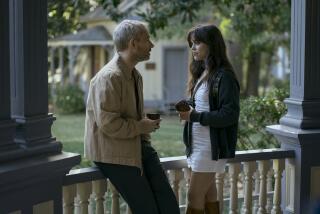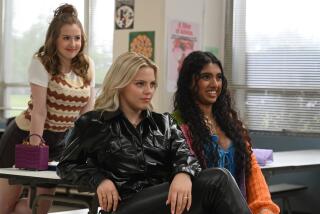‘80s teen gem ‘Valley Girl’ unconvincingly remade as a jukebox musical
- Share via
The 1983 film “Valley Girl” was the sort of lightning-in-a-bottle confluence of careers and a cultural moment that comes along all too rarely. Directed by Martha Coolidge, it helped launch Nicolas Cage to stardom and explored the subcultures of preppies and punks via the neat divide of the sun-kissed suburbia of the San Fernando Valley and the nocturnal seediness of Hollywood with a touch of the star-crossed lovers of “Romeo and Juliet” or “The Graduate.”
The film, laced with a dynamic soundtrack of contemporary pop songs that have since become nostalgic signifiers, has been remade as a full-on musical, retaining its ‘80s setting and including even more hits of the day. Directed by Rachel Lee Goldenberg and written by Amy Talkington, the new movie again tells the story of how Julie (Jessica Rothe), a teenage girl from the Valley, meets and falls for a punk rocker named Randy (Joshua Whitehouse) as their social worlds collide.
The movie opens with Alicia Silverstone as the older Julie, wearing a David Bowie T-shirt and a drapey sweater, trying to soothe her teenage daughter (Camila Marrone) after a breakup by telling a story from her own youth. Framing the entire ‘80s story as a flashback allows for the stylization of the costumes and settings and even the characters’ tendency to break out into song-and-dance numbers.
Yet the original film was not a time capsule; it was a snapshot, capturing a unique time and place. The new film simply doesn’t have the same spark and energy. In probably the wittiest wink in the new film, as Julie and Randy first cruise around Hollywood, the images of landmarks like the Chinese Theatre and Musso and Frank Grill or even passersby on the street all come from the original film.
It is unfair to compare Whitehouse to teenage Nicolas Cage, whose performance was an early glimpse of the distinctive talent and presence that would make him such an enduring star. Yet Whitehouse never finds a way to make the character fully his own, leaving something of a charisma vacuum at the film’s center. As for Rothe, while she brings a warmth and brightness to Julie, when the role’s original actress, Deborah Foreman, appears for a moment as a shopgirl at the mall, her beguiling presence immediately reminds of all that is missing.
The movie is filled with other fun cameos and small parts, including E.G. Daily and Heidi Holicker from the original film, Thomas Lennon as famed L.A. DJ Rodney Bingenheimer, Judy Greer and Rob Huebel as Julie’s parents, Randall Park as the school principal, Mae Whitman as Randy’s best friend, social media star Logan Paul as a rival love interest and even Los Angles Mayor Eric Garcetti as a school employee.
The original was not strictly a musical, but its use of pop songs and live bands gave it a musical’s buoyancy and momentum. No one will remember the bands American Authors and Deap Vally playing ‘80s covers in the new film in the same way they do the Plimsouls or Josie Cotton performing their songs in the earlier film.
In one of the new film’s biggest changes, Randy has a band of his own and throughout the film is seen working on a song that will become “I Melt With You” by the band Modern English and one of the anthemic totems deeply identified with the 1983 film. But what should be Randy’s big moment to perform the song is sort of thrown away, and the song is picked up by another band in the movie as if it were already a well-known hit. The whole story point becomes confusing and contradictory.
The way established I.P.s, franchises and nostalgia dominate the thinking about attracting audiences in contemporary Hollywood is standard operating procedure. Yet it’s the additions to this remake of “Valley Girl” — deepening and complicating the relationships between Julie and her girlfriends, giving Julie more clearly defined aspirations of her own — that are the brightest moments. It’s too bad they could not have been used in a story all their own, something original, whether set in our contemporary time or the past. With intermittent flashes of charm, the new “Valley Girl” never fully finds its own tune, making it less a spirited cover version interpretation and more of an unconvincing karaoke imitation.
‘Valley Girl’
Rated: PG-13, for teen partying, language, some suggestive material and brief nudity
Running Time: 1 hour and 43 minutes
Playing: Starts May 8, Mission Tiki Drive-In, Montclair; also on VOD
More to Read
Only good movies
Get the Indie Focus newsletter, Mark Olsen's weekly guide to the world of cinema.
You may occasionally receive promotional content from the Los Angeles Times.











